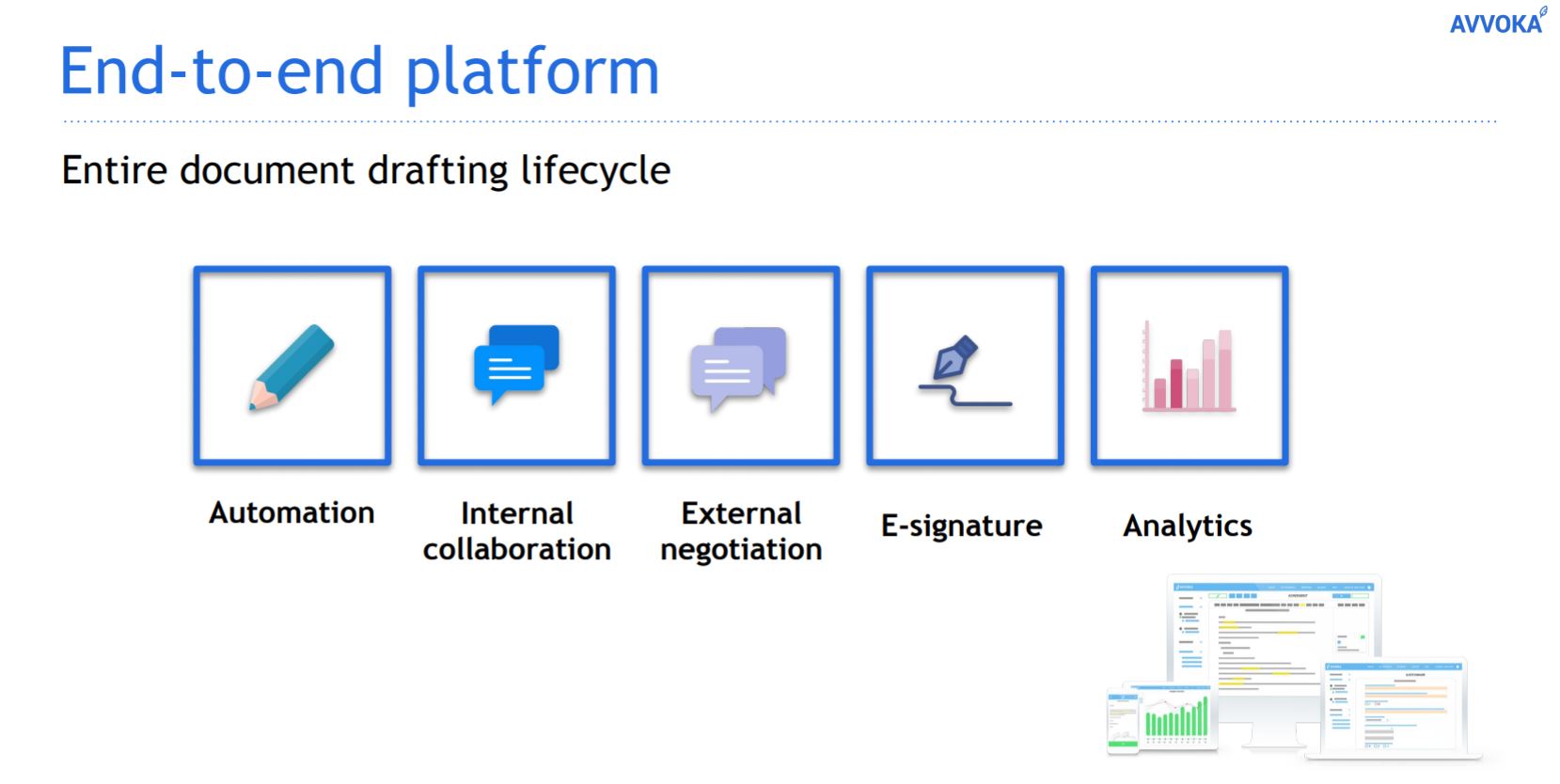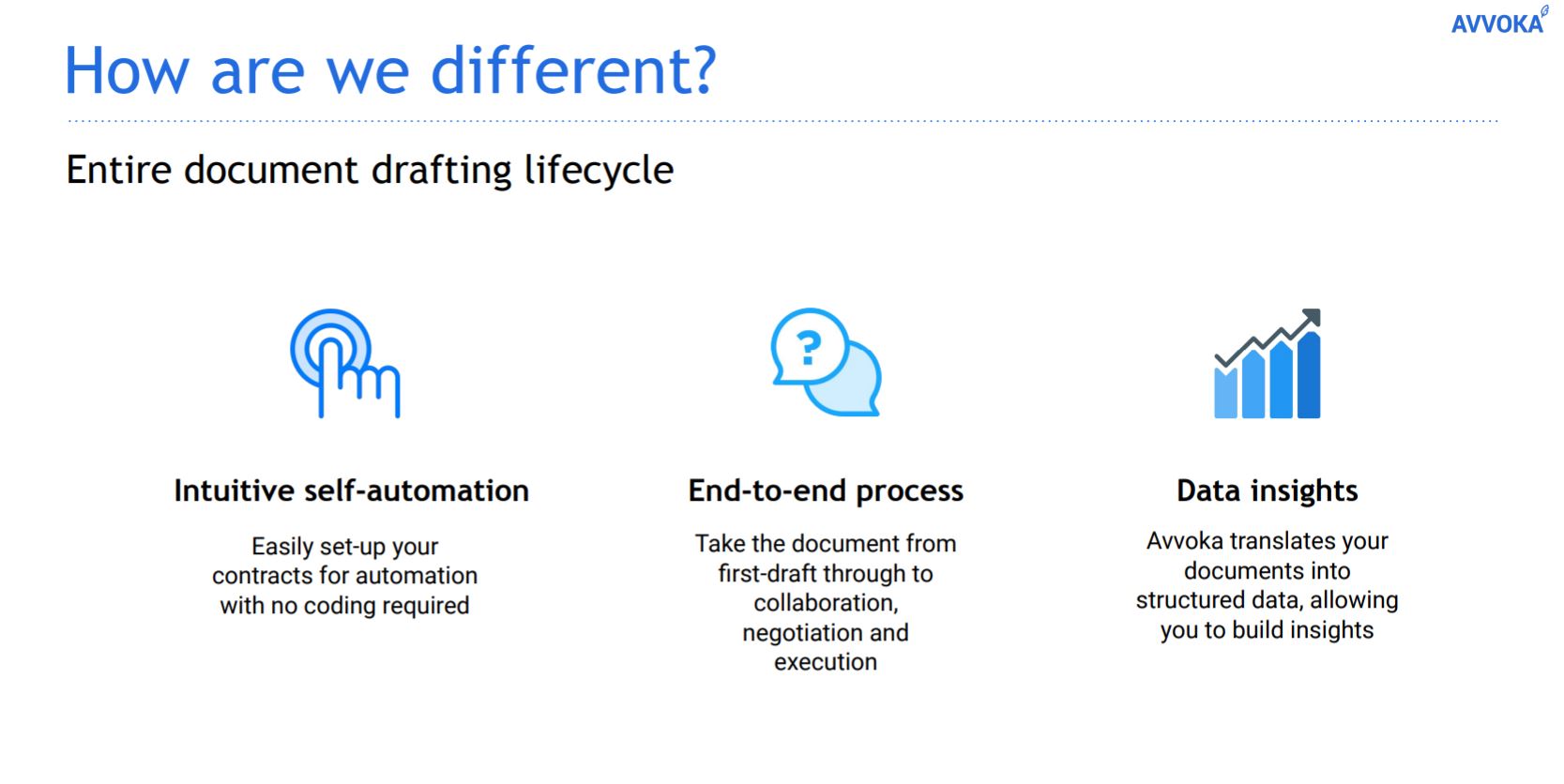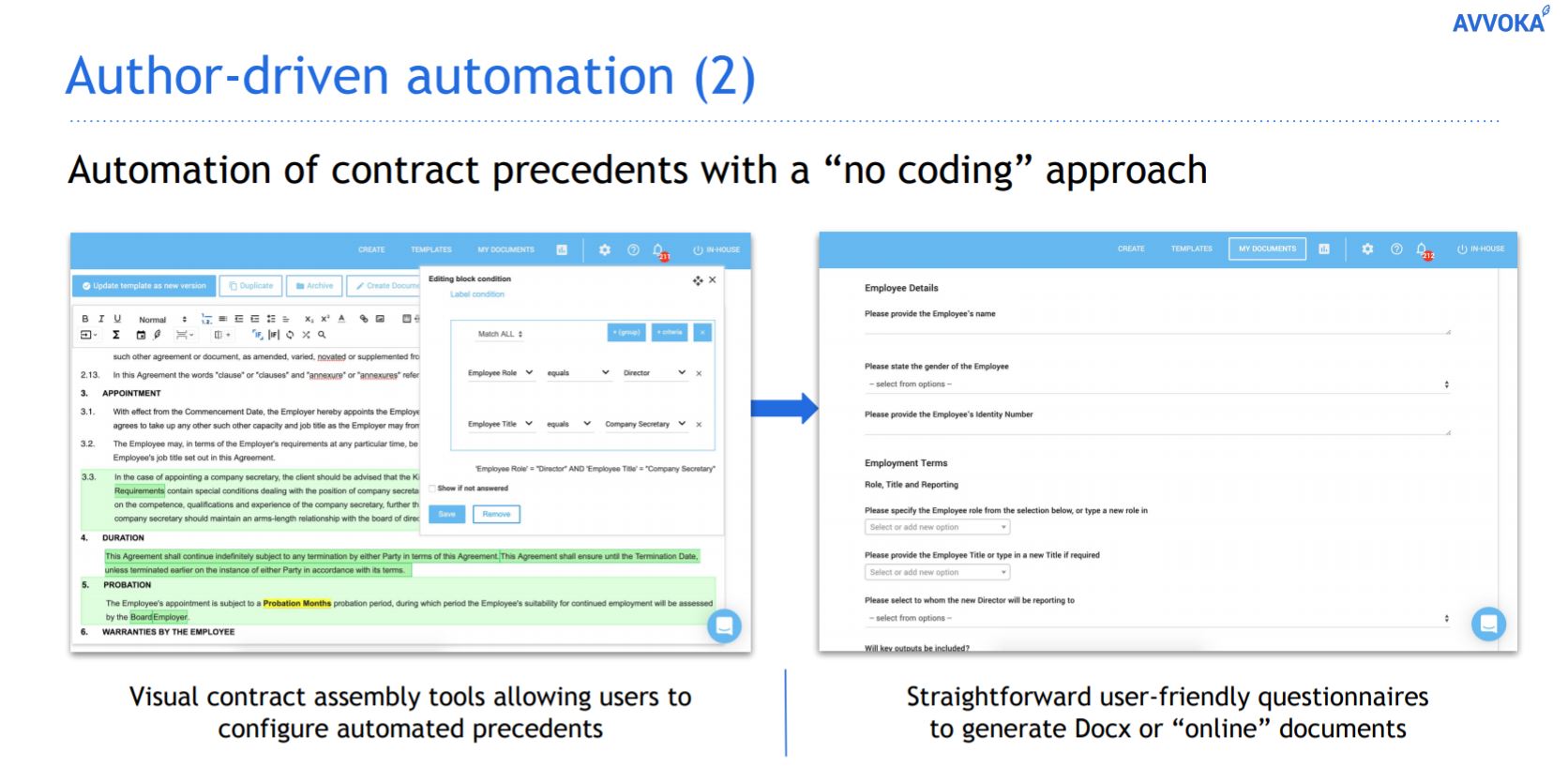We had the pleasure of speaking with Mr. Giles Thompson of Avvoka. Avvoka is a really cool tool that helps automate agreement drafting. Here’s what Giles has to say:
An insight into Avvoka and the inspiration behind it
We are an online-based document automation platform. Our tool encompasses end-to-end document automation: everything from automated first drafts to online document collaboration, negotiation, e-signature and data analytics.
In terms of inspiration, our founders ran into the problem while practising law and our solution has been validated through our own experiences and by speaking to colleagues in the legal sector.
Focusing on our core technology, we do simple and intuitive document automation. However, we do not compromise on power or sophistication. Think of us as the honey badger of document automation – we look unassuming and pretty, but our platform can handle almost anything document automation-related, and we achieve this in seconds and hours, not weeks and months.
There are five key elements to the platform. These span the whole range of the document automation process – automation, collaboration, negotiation, execution and analytics:
Document Automation:
Most other tools on the market involve ‘coding’ to create automated documents. Our intuitive, visual onboarding tools allow anyone to learn automation in hours, not weeks. Anyone can create automated documents using standard form precedents with no need for external consultants. This allows you to generate a document, in seconds, by answering a questionnaire. But we don’t stop there, unlike most traditional automation tools.
Internal collaboration:
Multiple people from one team can work together on a document at the same time, in real-time (reminiscent of google docs, but for lawyers). There is no need to put together divergent document versions in a messy collage. Within your documents, tag or assign tasks to your colleagues or external parties. Our platform is built with security and auditability in-mind. As such, we have a range of features built by lawyers, for lawyers, including version comparison and granular rights.
External Negotiation:
Negotiate online via your browser, avoid delay and email ping-pong. You can negotiate even the most complex documents on the platform. We’ve consciously designed it to be practical, and we have baked in the concept of the virtual adversarial tennis net. It is all fully and easily auditable (in a way that email traffic is not) and you can block negotiation on specific provisions (if you have the leverage).
Execution/ E-signature:
E-sign seamlessly and remotely. We have our own free tool called AvvokaSign, but you can use commonly used tools such as DocuSign or Adobe.
Analytics:
Through automating and digitally negotiating your documents, you are turning your documents into structured data. You, by design, maintain easy access to your crucial commercial data when you use Avvoka as it’s not lost (it’s not offline or in translation, over email). You can automatically build a data treasure trove, and we give you the key, which you can easily view to gain insights about the data attached to your documents. Want to know how often your payment terms are challenged? Want to know how often your liability cap is amended? Want an automatic summary of every deal you’ve just agreed, and your responsibilities going forward, straight after? We can tell you.

Brief outline of the journey so far
Covering our beginnings in a little more detail, we were founded in late 2015 by David Howorth and Eliot Benzecrit, two former solicitors at Linklater and Slaughter and May (both part of the “Magic Circle”) respectively. Avvoka was started to help bring efficiency and transparency to the contracting process, in doing so, to free up the time of lawyers and business teams to do more high-level advisory and technical legal or commercial work that our clients are great at.

Avvoka was inspired by what David and Eliot experienced as junior lawyers, and the opportunities for process improvements that they identified while in these roles, particularly for more repetitive work streams or tasks. Having initially looked at consumer-facing contracting applications available on the market, they looked to take the design-led and user-experience from these products, and apply it to the corporate law world around them. The company secured a place in Allen & Overy’s first Fuse cohort in 2017, and since then we’ve grown exponentially.
A notable highlight will be the launch of LMA.Automate in January next year, a document automation project, alongside the LMA and A&O.
In terms of where the rest of the team fit into this puzzle, I’m Head of Growth and was a former technology lawyer at Herbert Smith Freehills and Kirkland & Ellis. The team has a mix of backgrounds. Some are former lawyers such as myself, some have studied law, and others have joined us on the back of a strong interest in the start-up scene. Nonetheless, it’s incredibly exciting to be involved in trying to help change the way an industry operates, which I believe ties in perfectly with the company’s mission. Avvoka was founded to allow lawyers and business people to delegate their most repetitive tasks to its platform document automation to free up their time to do more of the high-level advisory technical, legal or commercial work that they are great at and enjoy most.
Relevance wrt the Asian context
In the Asia-Pacific (APAC) region, we opened an office in Singapore last year. We have enjoyed substantial growth in the APAC region, with a focus on the Singapore and Hong Kong markets. Under our current growth push, we believe that working with new Asian clients would not only provide an invaluable opportunity from a sales perspective but would also help us to successfully address potential pain-points unique to the Asian legal market(s).
Dealing with competition and creating your own mark
The metrics we achieve for our clients are: time saved, quality, ability to tackle volume, consistency, ability to create new products or services. However, in particular, we also ensure our clients have the ability to do more in less time. For in-house teams, we focus on consistency maintenance, which is really important, alongside the ability to have direct oversight and lots of data for a rainy day.
Our clients perceive us as much quicker and more agile than competitors; this matches the fast pace nature of the work they are expected to do. We work very hard to understand the exact pain point our clients are feeling. Instead of just immediately placing a button where they ask, we try to understand what is deficient in the current solution, and how we can improve it. Sometimes it might be adding that button, but other times we can add something that skips that entire part of the process and makes it ten times better.
Quotes / principles / thoughts that resonate with your organization’s culture and personality
Most simply put, our philosophy is made up of two parts. Firstly, put control of document automation back into the hands of the people who know their documents best, whilst freeing up their time to do more high-level advisory and technical legal or commercial work that our clients are great at. Secondly, we want to make automation a skill that every person has at their disposal when writing documents. These two parts sound basic, but most tools don’t achieve them. As many of the team used to be working long hours as solicitors themselves, we want to help our clients finish their working day a lot earlier than they would have to.
Some buzzwords we relate to are client-first, agility, speed, proactiveness.
Aside from that, as I mentioned above, it’s incredibly exciting to be involved in trying to help change the way an industry operates – we’re all fascinated by the intersection of technology and law.
How the next 5 years look like for Avvoka
Our overarching aim is that we want to be the automation and negotiation tool of choice in the legal industry – we want to be pinned on every lawyer’s chrome browser. Beyond that, we want people to think of automation in the same way people think about changing numbering styles in Word or know how to extract a signature page from a PDF, both of which immediately pop into the mind of every lawyer when they start a matter. In other words, we want them to think “but first, can we make this more efficient using Avvoka?”
Some concrete objectives coming up include a brand new version of our software, with an even more powerful engine. Those using our platform will be able to lift even heavier documents, have even more complex workflows, a clearer UI and more partnerships and integrations (with great tech products) using our super flexible API. We know that clients want to use best in breed or the best value for money for each part of their document-related activities. As such, we’re scoping exciting collaborations with AI review tools. By combining these tools and Avvoka’s document automation capabilities, you can start to automate the end-to-end process of huge tasks such as DD reports or mass-repapering. We’re also looking at other data systems to achieve an out-of-the-box integration with Avvoka for a greater range of systems. We’ll also be building on the analytics feature of our platform by looking at tools such as Tableau and PowerBi.
In the short term, we’ll be delivering LMA.Automate, our flagship collaboration with Allen & Overy and the LMA. We’ll also build on more general document automation evangelising and education. Our Avvoka Academy has been running successfully since the first lockdown in the UK, and we expect that to continue to grow. We’ve started to line up educational collaborations with universities, professional bodies and industry interest groups.
We’ve had hiring spree across both offices, with four new team members joining recently. And as with any start-up, we’re hoping to break into the US market. But we do want it to be driven by our clients, many of whom have vast global operations (although we knew that you could run an international team remotely well before COVID-19, it would be a tad challenging to launch remotely!).
Advice for fellow changemakers and readers
We see that legal tech has always been a part of the conversation around the business of law. If you think about it, email and tools like practical law is legal tech, and are core to what lawyers do – they just weren’t called ‘legal tech’ at the time, they were just bits of technology law firms used.
We think that the aim for document Automation should ultimately be to be seen as an essential tool for lawyers, like eDiscovery is quickly becoming, as opposed to something alien or even really thought of as ‘legal tech’ as opposed to something internalised into everyday legal practice (like email and online precedent libraries have). There is a danger that ‘buzzwords’ put people off using something. But even Microsoft Word was probably considered ‘legal tech’ at one point.
Legal service productisation is a relevant trend to follow – we expect to see far more of this.
It seems like law firms are moving away from developing tech in-house, but are still looking to marry their knowledge and expertise with technology to provide some incredibly forward-thinking legal services. You need to persuade clients of their tipping point – the point where automation becomes a no brainer. The tipping point is where the change of mindset is that when a piece of work comes in, the first question is “can this be automated,” like “can this work be done more efficiently, using a systematic process.” You need to give people so people can spot the opportunities and are trained up and ready to react to opportunity rapidly.
You need to persuade clients of their tipping point – the point where automation becomes a no brainer.
The tipping point is where the change of mindset is that when a piece of work comes in, the first question is “can this be automated,” like “can this work be done more efficiently, using a systematic process.” You need to give people so people can spot the opportunities and are trained up and ready to react to opportunity rapidly.
So next time you want to draw up a rent agreement, employment contract, business contract, or a loan agreement, don’t forget to log on to https://avvoka.com/.
Also read: Here’s all about LegalMind, an Indian legaltech startup helping lawyers automate their workflow!

